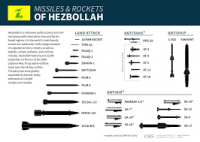-
U.S. Cyber Command cut Russian troll factory’s access to the internet

The U.S. Cyber Command blocked the internet access of the St. Petersburg’s-based Internet Research Agency (IRA), a Russian disinformation and propaganda outfit which was contracted by the Kremlin to orchestrate the social media disinformation campaign to help Donald Trump win the 2016 presidential election. The IRA’s access to the internet was blocked on midterms Election Day, and for a few days following the election.
-
-
Putin's Big Power play in Ukraine
For twenty years, Vladimir Putin, the strongman of Russia, has schemed to subvert and annex the neighboring country of Ukraine. Now, with the world distracted over Brexit and Venezuela, he is making his move.
-
-
Israel fighting Iran’s efforts to upgrade Hezbollah’s rockets

Israel has been countering Iranian efforts to use suitcases to smuggle GPS components into Syria to upgrade Hezbollah’s rocket arsenal. In 2017, once it appeared that Syrian dictator Bashar al-Assad would survive the civil war that was tearing his country apart, “Iran embarked on a grandiose plan for increasing its influence in the shattered country,” says an expert. Iran’s goal was to “build a force of up to 100,000 Shiite fighters from Pakistan, Afghanistan and Iraq. They built intelligence bases and an air force base within each Syrian airbase. And they brought civilians in order to indoctrinate them,” said Israel Defense Force’s former chief of staff, Gen. Gadi Eisenkot.
-
-
700,000 submunitions demilitarized by Sandia-designed robotics system

More than 700,000 Multiple Launch Rocket System submunitions have been demilitarized since the Army started using an automated nine-robot system conceptualized, built and programmed by Sandia Lab engineers. The automated system was built for the Army’s demilitarization program that aims to dismantle obsolete ammunition and missiles.
-
-
Marine organisms as detectors of enemy undersea activity
Goliath grouper, black sea bass, and snapping shrimp, along with bioluminescent plankton and other microorganisms, are set to be the unlikely additions to protecting U.S. assets. Researchers are developing new types of sensor systems that detect and record the behaviors of these marine organisms and interpret them to identify, characterize, and report on the presence of manned and unmanned underwater vehicles operating in strategic waters. The incorporation of biological signals will extend the range, lifetime, and performance of undersea surveillance technologies in strategic waters.
-
-
On rogues and peers: Russian, Chinese challenges to U.S. national security
Russia and China represent distinct challenges to U.S. national security. Russia is not a peer or near-peer competitor but rather a well-armed rogue state that seeks to subvert an international order it can never hope to dominate. In contrast, China is a peer competitor that wants to shape an international order that it can aspire to dominate.
-
-
Russia, China threaten U.S. space dominance: Pentagon
The Defense Intelligence Agency (DIA), the Pentagon’s lead intelligence agency, has warned that Russia and China are building technologies which will soon threaten U.S. dominance in space. Both countries “are developing a variety of means to exploit perceived U.S. reliance on space-based systems and challenge the U.S. position in space,” the report said. Russian doctrine “involves employing ground, air, and space-based systems to target an adversary’s satellites, with attacks ranging from temporary jamming or sensor blinding to destruction of enemy spacecraft and supporting infrastructure,” the report said.
-
-
Lawmakers tell Pentagon to redo climate change report
Earlier this month, the Pentagon, in compliance with a congressional mandate, released a landmark report which identified the 79 American military installations most vulnerable to the “effects of a changing climate.” Several Democrats on the House Armed Services Committee welcomed the report – but at the same time harshly criticized it for failing to include details requested by Congress, among them the estimates by each of the armed services of the cost of protecting or replacing the ten most vulnerable military bases.
-
-
Moscow says new missile systems planned to counter U.S. by 2021
Russian Defense Minister Sergei Shoigu says Moscow will push to develop two new land-based missile systems before 2021 in response to Washington’s planned exit from a landmark nuclear arms control agreement. The U.S. withdrawal from the Cold War-era Intermediate-Range Nuclear Forces (INF) Treaty came after Washington repeatedly accused Moscow of violating the accord, which bans both countries from stationing short- and intermediate-range land-based missiles in Europe.
-
-
U.S. intel chiefs warn Washington risks losing friends, influence
U.S. intelligence chiefs are sounding alarms about an ever more perilous future for the United States, one in which the country is in danger of seeing its influence wane, its allies waiver, and key adversaries team up to erode norms that once kept the country safe and the world more stable. “It is increasingly a challenge to prioritize which threats are of greatest importance,” Dan Coats, Director of National Intelligence, said, sharing testimony that often and repeatedly contradicted past assertions by President Donald Trump. “During my tenure as DNI now two years and I have told our workforce over and over that our mission was to seek the truth and speak the truth,” Coats pointedly stated. Driving many of the concerns, according to intelligence officials, is a growing alliance between Russia and China competing against the U.S. not just for military and technological superiority, but for global influence.
-
-
Russia’s hostile measures threaten Europe: Report
A new RAND report examines current Russian hostile measures in Europe and forecasts how Russia might threaten Europe using these measures over the next few years. “Whatever the U.S. response, preparation for involvement in a wide range of conflicts can help reduce the risk of mismanagement, miscalculation, and escalation,” the report’s authos say.
-
-
Breeding challenges of land mine-finding rats
Thousands of people – many of them children – are hurt or killed by land mines each year, so finding these devices before they explode is critical. There is a surprising champion of detection: the African giant pouched rat. Native to sub-Saharan Africa, the pouched rats are large – they can grow up to 3 feet long, including the tail – but are still too small to set off the land mines. They have an exceptional sense of smell – they are also used to detect tuberculosis – but scientists know very little about their biology or social structure, and they’re difficult to breed in captivity.
-
-
New U.S. intel strategy warns of more “turbulent” times ahead
U.S. intelligence agencies trying to plot their course for the next four years are facing an ever more chaotic world, complicated by a weakening of the Western-led international order, rapidly changing technology. The new strategy identifies the two main challenges the U.S. is facing as “the weakening of the post-WWII international order and dominance of Western democratic ideals,” and what it calls “increasingly isolationist tendencies in the West.” U.S. intelligence officials also warned that the proliferation of advanced technology has enabled adversaries, big and small, to close the gap on Washington. “We see Russia pursuing, with a vim and vigor that I haven’t seen since the ’80s, capabilities to reach us,” a senior intelligence official warned.
-
-
Benefits of next-generation wargames
Technological advances for game engines and cloud architectures are fueling the development of next-generation wargames that can increase insights for policymakers. Researchers say that the new technologies are making wargame tools more accessible and providing strategists with more insights.
-
-
Administration unveils its Missile Defense Review
Thirty-five years after Ronald Reagan vowed to make nuclear weapons “impotent and obsolete,” the administration has today unveiled its Missile Defense Review – the latest iteration of U.S. efforts to build an effective ballistic missile defense. The Pentagon says that its search for more effective missile defense technologies is the result of its focus on near-peer adversaries such as China and Russia, but the administration’s Missile Defense Review appears more suitable for defending the United States against more limited attacks, such as those likely to come from North Korea or, perhaps, Iran.
-
More headlines
The long view
Factories First: Winning the Drone War Before It Starts
Wars are won by factories before they are won on the battlefield,Martin C. Feldmann writes, noting that the United States lacks the manufacturing depth for the coming drone age. Rectifying this situation “will take far more than procurement tweaks,” Feldmann writes. “It demands a national-level, wartime-scale industrial mobilization.”
